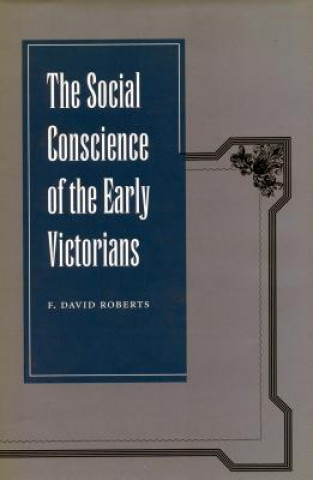
Kód: 04717506
Social Conscience of the Early Victorians
Autor F.Davaid Roberts
In 1830, the dominant social outlook of the early Victorians was a paternalism that looked to property, the Church, and local Justices of the Peace to govern society and deal with its ills. By 1860, however, the dominant social ou ... celý popis
- Jazyk:
 Angličtina
Angličtina - Vazba: Pevná
- Počet stran: 584
Nakladatelství: Stanford University Press, 2002
- Více informací o knize

3119 Kč
Dostupnost:
50 % šance Máme informaci, že by titul mohl být dostupný. Na základě vaší objednávky se ho pokusíme do 6 týdnů zajistit.
Máme informaci, že by titul mohl být dostupný. Na základě vaší objednávky se ho pokusíme do 6 týdnů zajistit.Prohledáme celý svět
Mohlo by se vám také líbit
-

Top Health Issues for Lgbt Populations
559 Kč -

Reading the Qur'an in Latin Christendom, 1140-1560
963 Kč -

Yes!
252 Kč -

Robert Therrien
1218 Kč -

Securing SQL Server
1676 Kč -

Electronic Structure of Disordered Alloys, Surfaces and Interfaces, 1
7468 Kč -

Platinum Notes : Surgical Sciences
780 Kč
Dárkový poukaz: Radost zaručena
- Darujte poukaz v libovolné hodnotě a my se postaráme o zbytek.
- Poukaz se vztahuje na celou naši nabídku.
- Elektronický poukaz vytisknete z e-mailu a můžete ihned darovat.
- Platnost poukazu je 12 měsíců od data vystavení.
Informovat o naskladnění knihy
Zadejte do formuláře e-mailovou adresu a jakmile knihu naskladníme, zašleme vám o tom zprávu. Pohlídáme vše za vás.
Více informací o knize Social Conscience of the Early Victorians
Nákupem získáte 312 bodů
 Anotace knihy
Anotace knihy
In 1830, the dominant social outlook of the early Victorians was a paternalism that looked to property, the Church, and local Justices of the Peace to govern society and deal with its ills. By 1860, however, the dominant social outlook had become a vision of a laissez faire society that relied on economic laws, self-reliance, and the vigorous philanthropy of voluntary societies. This book describes and analyzes these changes, which arose from the rapid growth of industry, towns, population, and the middle and working classes. Paternalism did not entirely fade away, however, just as a laissez faire vision had long antedated 1830. Both were part of a social conscience also defined by a revived philanthropy, a new humanitarianism, and a grudging acceptance of an expanded government, all of which reflected a strong revival of religion as well as the growth of rationalism. The new dominance of a laissez faire vision was dramatically evident in the triumph of political economy. By 1860, only a few doubted the eternal verities of the economists' voluminous writings. Few also doubted the verities of those who preached self-reliance, who supported the New Poor Law's severity to persons who were not self-reliant, and who inspired education measures to promote that indispensable virtue. If economic laws and self-reliance failed to prevent distress, the philanthropists and voluntary societies would step in. Such a vision proved far more buoyant and effective than a paternalism whose narrow and rural Anglican base made it unable to cope with the downside of an industrial-urban Britain. But the vision of a laissez faire society was not without its flaws. Its harmonious economic laws and its hope in self-reliance did not prevent gross exploitation and acute distress, and however beneficent were its philanthropists, they fell far short of mitigating these evils. This vision also found a rival in an expanded government. Two powerful ideas--the idea of a paternal government and the idea of a utilitarian state--helped create the expansion of government services. A reluctant belief in governmental power thus joined the many other ideas that defined the Victorian's social conscience.
 Parametry knihy
Parametry knihy
Zařazení knihy Knihy v angličtině Humanities History Regional & national history
3119 Kč
- Plný název: Social Conscience of the Early Victorians
- Autor: F.Davaid Roberts
- Jazyk:
 Angličtina
Angličtina - Vazba: Pevná
- Počet stran: 584
- EAN: 9780804745321
- ISBN: 0804745323
- ID: 04717506
- Nakladatelství: Stanford University Press
- Hmotnost: 898 g
- Rozměry: 229 × 152 × 36 mm
- Datum vydání: 07. August 2002
Oblíbené z jiného soudku
-

Hundred Years' War on Palestine
330 Kč -

Ethnic Cleansing of Palestine
358 Kč -

History of Japan
405 Kč -

Ten Myths About Israel
336 Kč -

Strange Death of Europe
410 Kč -

Decline and Fall of the Roman Empire
130 Kč -

Secret History
320 Kč -

God's Playground A History of Poland
1700 Kč -

Mayflower
385 Kč -

How to be a Victorian
357 Kč -

Plantagenets
331 Kč -

General's Son
428 Kč -

Iran: A Very Short Introduction
225 Kč -

Temples of Karnak
3800 Kč -

Twenty Years A-Growing
249 Kč -

Cuneiform
276 Kč -

History of Witchcraft in England from 1558 to 1718
453 Kč -

China in Africa
894 Kč -

Bohemian Paris
414 Kč -

Islandman
249 Kč -

Alexiad
423 Kč -

Lancaster And York
490 Kč -

Modern France: A Very Short Introduction
233 Kč -

Inside Hitler's Greece
513 Kč -

Diana: Her True Story - In Her Own Words
306 Kč -

The Fourth Turning
441 Kč -

The Oxford History of Ancient Egypt
418 Kč -

Churchill: The Power of Words
410 Kč -

Palestine
534 Kč -

Korean History in Maps
706 Kč -

Great Gatsby (Wisehouse Classics Edition)
405 Kč -

Viking Way
1144 Kč -

The Thirteenth Tribe
308 Kč -

My Promised Land
358 Kč -

Vanished Kingdoms
514 Kč -

Age Of Revolution
410 Kč -

Life and Death of Anne Boleyn
624 Kč -

Coming of the Third Reich
464 Kč -

Children of Ash and Elm
464 Kč -

Europe Between the Oceans
798 Kč -

Socialism Betrayed
475 Kč -

303 Squadron
452 Kč -

Ancient Celts, Second Edition
623 Kč -

Dancing in the Glory of Monsters
395 Kč -

Battle of Britain: Luftwaffe Blitz (Images of War)
606 Kč -

Age of Confucian Rule
851 Kč -

Beyond Band of Brothers
410 Kč -

Benjamin Franklin
410 Kč -

On China
462 Kč
Osobní odběr Praha, Brno a 12903 dalších
Copyright ©2008-24 nejlevnejsi-knihy.cz Všechna práva vyhrazenaSoukromíCookies


 Vrácení do měsíce
Vrácení do měsíce 571 999 099 (8-15.30h)
571 999 099 (8-15.30h)